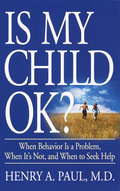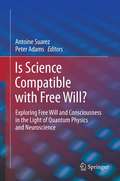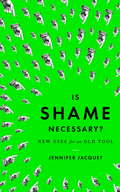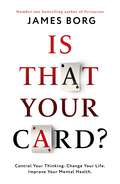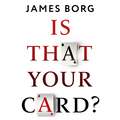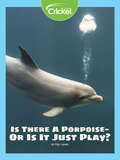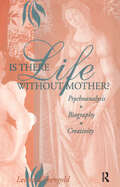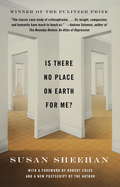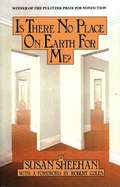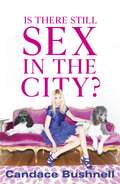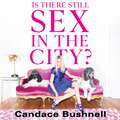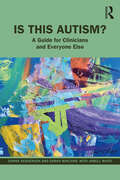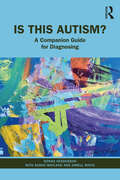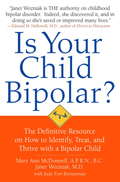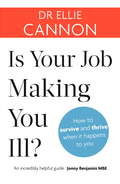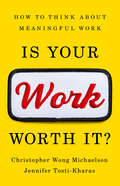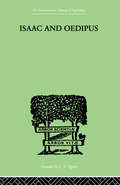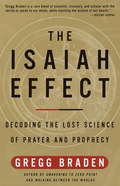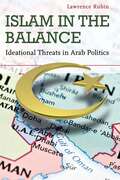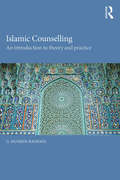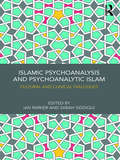- Table View
- List View
Is My Child OK? When Behavior Is a Problem, When It's Not, and When to Seek Help
by Henry A. PaulMy kindergartner insists on wearing the same dress day after day. What should I do? My twelve-year-old is a target of the class bully. Should I intervene? My four-year-old is coming home with other kids' toys in his pocket. Should I be concerned? Is my child normal? Every parent has asked the question at one time or another. Now this wise and compassionate guide, written by an expert in children's mental health, offers reassuring words for worried parents--plus concrete ways to spot the difference between a normal stage of development... and a true problem. In most cases, childhood problems will clear up with a healthy dose of common sense and loving parental attention. But sometimes professional help or medication is needed. This one-stop reference book--organized by symptom and covering everything from tantrums to learning disorders--tells parents what's "normal," what's not, how best to help your child through a rocky period, and when to get an expert's help. Discover: How much fighting between siblings is "normal" (page 94) What to do if your child is the class bully--or the victim of a bully (page 89) How to determine if your child has ADD--or if he's just a little more active and a little less patient (page 106) Tough questions parents must ask themselves when they're dealing with chronic separation anxiety (page 37) How to help a child who suddenly refuses to go to school (page 124) The growing concern surrounding childhood eating disorders (page 172) And much more.
Is Science Compatible with Free Will?
by Antoine Suarez Peter AdamsAnyone who claims the right 'to choose how to live their life' excludes any purely deterministic description of their brain in terms of genes, chemicals or environmental influences. For example, when an author of a text expresses his thoughts, he assumes that, in typing the text, he governs the firing of the neurons in his brain and the movement of his fingers through the exercise of his own free will: what he writes is not completely pre-determined at the beginning of the universe. Yet in the field of neuroscience today, determinism dominates. There is a conflict between the daily life conviction that a human being has free will, and deterministic neuroscience. When faced with this conflict two alternative positions are possible: Either human freedom is an illusion, or deterministic neuroscience is not the last word on the brain and will eventually be superseded by a neuroscience that admits processes not completely determined by the past. This book investigates whether it is possible to have a science in which there is room for human freedom. The book generally concludes that the world and the brain are governed to some extent by non-material agencies, and limited consciousness does not abolish free will and responsibility. The authors present perspectives coming from different disciplines (Neuroscience, Quantumphysics and Philosophy) and range from those focusing on the scientific background, to those highlighting rather more a philosophical analysis. However, all chapters share a common characteristic: they take current scientific observations and data as a basis from which to draw philosophical implications. It is these features that make this volume unique, an exceptional interdisciplinary approach combining scientific strength and philosophical profundity. We are convinced that it will strongly stimulate the debate and contribute to new insights in the mind-brain relationship.
Is Shame Necessary?
by Jennifer JacquetAn urgent, illuminating exploration of the social nature of shame and of how it might be used to promote large-scale political change and social reform. In cultures that champion the individual, guilt is advertised as the cornerstone of conscience. But while guilt holds individuals to personal standards, it is powerless in the face of corrupt institutions. In recent years, we as consumers have sought to assuage our guilt about flawed social and environmental practices and policies by, for example, buying organic foods or fair-trade products. Unless nearly everyone participates, however, the impact of individual consumer consciousness is ineffective. Is Shame Necessary? presents us with a trenchant case for public shaming as a nonviolent form of resistance that can challenge corporations and even governments to change policies and behaviors that are detrimental to the environment. Jennifer Jacquet argues that public shaming, when it has been retrofitted for the age of social media and aimed in the proper direction, can help compensate for the limitations of guilt in a globalized world. Jacquet leaves us with a new understanding of how public shame, when applied in the right way and at the right time, has the capacity to keep us from failing other species in life's fabric and, ultimately, from failing ourselves.From the Hardcover edition.
Is That Your Card?: Control Your Thinking. Change Your Life. Improve Your Mental Health.
by James BorgLearn how to control your perceptions and emotions, minimise dysfunctional thinking and achieve greater success in life.We're all dealt certain 'cards' in life, the daily challenges we need to overcome in order to thrive. Tackling the problems and challenges of everyday life begins with our thinking. Our thoughts and behaviours can propel us forward or sabotage our goals and relationships. This practical, eye-opening book draws on the philosophy of the ancient Stoics and the ground-breaking therapy of Dr Albert Ellis to help you achieve your goals.Is That Your Card? will help you change your mindset for the better, putting you in position to propel yourself to greater success. You will learn simple techniques to right the ship when harmful, negative thoughts take over because it is our beliefs that decide how we look at a situation. The act of thinking will never be the same as you become more aware of your emotions, gain more confidence and self-esteem, improve your relationships and look at anxiety and anger in a completely different way.Just remember: don't believe everything you think.'A guide to help us back on the path to good mental health and wellbeing' - Dr Sian Williams, counselling psychologist and BBC broadcasterPraise for Persuasion'This book is spot-on and should be a must-read' - Daily Telegraph'A rare "self-help" book - marvellously readable and fun. Hugely to be recommended' - Jilly CooperPraise for Mind Power'The best of the current self-help books' - The Guardian
Is That Your Card?: Control Your Thinking. Change Your Life. Improve Your Mental Health.
by James BorgLearn how to control your perceptions and emotions, minimise dysfunctional thinking and achieve greater success in life.We're all dealt certain 'cards' in life, the daily challenges we need to overcome in order to thrive. Tackling the problems and challenges of everyday life begins with our thinking. Our thoughts and behaviours can propel us forward or sabotage our goals and relationships. This practical, eye-opening book draws on the philosophy of the ancient Stoics and the ground-breaking therapy of Dr Albert Ellis to help you achieve your goals.Is That Your Card? will help you change your mindset for the better, putting you in position to propel yourself to greater success. You will learn simple techniques to right the ship when harmful, negative thoughts take over because it is our beliefs that decide how we look at a situation. The act of thinking will never be the same as you become more aware of your emotions, gain more confidence and self-esteem, improve your relationships and look at anxiety and anger in a completely different way.Just remember: don't believe everything you think.'A guide to help us back on the path to good mental health and wellbeing' - Dr Sian Williams, counselling psychologist and BBC broadcasterPraise for Persuasion'This book is spot-on and should be a must-read' - Daily Telegraph'A rare "self-help" book - marvellously readable and fun. Hugely to be recommended' - Jilly CooperPraise for Mind Power'The best of the current self-help books' - The Guardian
Is That Your Card?: Control Your Thinking. Change Your Life. Improve Your Mental Health.
by James BorgLearn how to control your perceptions and emotions, minimise dysfunctional thinking and achieve greater success in life.We're all dealt certain 'cards' in life, the daily challenges we need to overcome in order to thrive. Tackling the problems and challenges of everyday life begins with our thinking. Our thoughts and behaviours can propel us forward or sabotage our goals and relationships. This practical, eye-opening book draws on the philosophy of the ancient Stoics and the ground-breaking therapy of Dr Albert Ellis to help you achieve your goals.Is That Your Card? will help you change your mindset for the better, putting you in position to propel yourself to greater success. You will learn simple techniques to right the ship when harmful, negative thoughts take over because it is our beliefs that decide how we look at a situation. The act of thinking will never be the same as you become more aware of your emotions, gain more confidence and self-esteem, improve your relationships and look at anxiety and anger in a completely different way.Just remember: don't believe everything you think.'A guide to help us back on the path to good mental health and wellbeing' - Dr Sian Williams, counselling psychologist and BBC broadcasterPraise for Persuasion'This book is spot-on and should be a must-read' - Daily Telegraph'A rare "self-help" book - marvellously readable and fun. Hugely to be recommended' - Jilly CooperPraise for Mind Power'The best of the current self-help books' - The Guardian
Is There a "Porpoise"—Or Is It Just Play?
by Peg LopataAs dolphins flip, whirling through blue waters and creating bubbles with their dorsal fins, scientists study if this playful act is fun and not just instinctual behavior, or as some marine psychologists believe, that porpoises practice hunting skills. Enjoy discovering what dolphins learn through playing games like “keep away” in our oceans and freshwater rivers!
Is There Life Without Mother?: Psychoanalysis, Biography, Creativity
by Leonard ShengoldIn this richly textured study of personal growth and creativity hemmed in by childhood disaster, Shengold compares the differing gifts and differing solutions of extraordinary talents as they seek to negotiate a universal longing to refind the mother without sliding back into neglect, abuse, and despair. In the foreground of his analysis are moving portraits of Jules Renard and Anthony Trollope and the densely packed traumatic legacy of their respective childhoods, the one limned in sustained psychological torture, the other framed by neglect and abandonment. Long acknowledged as a master of the literary-biographic genre within psychoanalysis, Shengold does not view the study of creative individuals as the occasion to make pontifical pronouncements about the nature of creativity. Rather, he sees such study as affording the opportunity to borrow from genius, insofar as the gifted writer who is psychologically astute often captures the challenges of life and the nuances of suffering in language that "ordinary" patients would use, if only they could. By integrating literary analysis with biographical data, Shengold arrives at an appealingly direct, demystified approach to great literature as a vehicle for apprehending the intricacies of enduring psychological dilemmas. For the solutions of truly creative individuals not only reflect an artistic temperament wed to extraordinarily gifts; they illuminate the solutions we are all in search of. Elegantly sparing in language and judicious in presenting source material, Is There Life Without Mother? is abundantly generous in the wealth of understanding it provides and the deeper reflection it provokes. From the subtleties of identification as a means of consolidating identity in the face of neglect to the return of the traumatic as a fate that even a writer's "literary revenge" cannot circumvent, this work takes the reader deeper into the wellsprings of personality change than that it is usually possible to go.
Is There No Place on Earth for Me
by Robert Coles Susan SheehanThis renowned journalist's classic Pulitzer Prize winning investigation of schizophrenia--now reissued with a new postscript--follows a flamboyant and fiercely intelligent young woman as she struggles in the throes of mental illness."Sylvia Frumkin" was born in 1948 and began showing signs of schizophrenia in her teens. She spent the next seventeen years in and out of mental institutions. In 1978, reporter Susan Sheehan took an interest in her and, for more than two years, became immersed in her life: talking with her, listening to her monologues, sitting in on consultations with doctors--even, for a period, sleeping in the bed next to her in a psychiatric center. With Sheehan, we become witness to Sylvia's plight: her psychotic episodes, the medical struggle to control her symptoms, and the overburdened hospitals that, more often than not, she was obliged to call home. The resulting book, first published in 1982, was hailed as an extraordinary achievement: harrowing, humanizing, moving, and bitingly funny. Now, some two decades later, Is There No Place on Earth for Me? continues to set the standard for accounts of mental illness.
Is There No Place on Earth for Me?
by Susan SheehanSylvia Frumkin a highly intelligent young girl became a schizophrenic in her late teens and spent most of the next seventeen years in and out of mental institutions. Susan Sheehan followed Sylvia for almost a year, talking with and observing her.
Is There Still Sex in the City?
by Candace BushnellCandace Bushnell gets personal in her new memoir - an investigation into what happens when a woman of a certain age (ok, let's call it 'middle') finds herself not-so-young, free and single in the city.MILFs, cougars, love, sex, divorce - Candace's brilliantly funny and honest first-person account lays bare the truth behind middle-aged romance. Among other revelations we read her Modern Day Cougar Compendium, including guidance on such important matters as the Unexpected Cub Pounce (sometimes the cub does the pouncing); what to do when your age-appropriate date asks you to pay for his kitchen renovation, and the Pluses and Minuses of Being Older and Wiser.
Is There Still Sex in the City?
by Candace BushnellCandace Bushnell gets personal in her new memoir - an investigation into what happens when a woman of a certain age (ok, let's call it 'middle') finds herself not-so-young, free and single in the city.MILFs, cougars, love, sex, divorce - Candace's brilliantly funny and honest first-person account lays bare the truth behind middle-aged romance. Among other revelations we read her Modern Day Cougar Compendium, including guidance on such important matters as the Unexpected Cub Pounce (sometimes the cub does the pouncing); what to do when your age-appropriate date asks you to pay for his kitchen renovation, and the Pluses and Minuses of Being Older and Wiser.
Is This Autism?: A Guide for Clinicians and Everyone Else
by Donna Henderson Sarah Wayland Jamell WhiteThough our understanding of autism has greatly expanded, many autistic individuals are still missed or misdiagnosed. This highly accessible book clarifies many ways that autism can present, particularly in people who camouflage to hide their autistic traits. The authors take the reader step by step through the diagnostic criteria, incorporating the latest research as well as quotes from over 100 autistic contributors that bring that research to life. They also describe many aspects of autism that are not included in the current diagnostic criteria, such as autistic strengths and co-occurring disorders. Readers will learn about highly relevant topics, such as different types of empathy, sensory systems that are not well known, neuro-crash and burn out, and relative versus absolute thinking. This book provides a deep, current, and neurodiversity-affirmative understanding of the less obvious presentations of autism. It is relevant to all healthcare professionals, educators, family members, autistic individuals, and anyone who is curious about autism. A clinical companion guide, Is This Autism? A Companion Guide for Diagnosing, is available for clinicians who make mental health diagnoses.
Is This Autism?: A Companion Guide for Diagnosing
by Donna Henderson Sarah Wayland Jamell WhiteThis companion guide to Is This Autism? A Guide for Clinicians and Everyone Else shows clinicians how to assess for the possibility of autism in clients of all ages. Understanding of autism has greatly expanded in recent years, and many clinicians feel ill-equipped or confused about how to incorporate this knowledge into their diagnostic process. As a result, countless unidentified autistic people do not have reasonable access to proper identification or support. This book describes current assessment methods, including interviewing, rating scales, self-report measures, social cognition tests, and behavioral observations. It also provides guidance regarding cultural considerations, common mistakes, and how to communicate with and support clients through the diagnostic process. This very practical clinical guide provides a clear and neurodiversity-affirmative approach to autism assessment, particularly for autistic individuals who have previously been missed. It is relevant to all healthcare professionals who want to learn how to identify autism in their clients.
Is Your Child Bipolar? The Definitive Resource on How to Identify, Treat, and Thrive with a Bipolar Child
by Mary Ann Mcdonnell Janet Wozniak Judy Fort BrennemanDesigned as a definitive resource on how to identify bipolar disorders in children, this book also focuses of effective treatments and resources available to parents today. McDonnell, who head her own non-profit organization supporting bipolar children, and Wozniak (Harvard Medical School) offer practical information on how to cope with bipolar children and teens and communicate concerns effectively to doctors, teachers and counselors. A section is included on how to properly diagnose a bipolar disorder, and how not to confuse this condition with other types of personality disorders. Annotation ©2008 Book News, Inc. , Portland, OR (booknews. com)
Is Your Job Making You Ill?: How to survive and thrive when it happens to you
by Dr Ellie Cannon'An incredibly helpful guide' Jonny Benjamin MBE'Groundbreaking . . . so relatable given the current way we approach our work' Amy Wall, Woman's WayWhat happens when the effects of work are far more detrimental to your wellbeing than a simple case of Sunday-night blues?Whether you're suffering from work-induced high blood pressure, depression, migraines, or panic attacks, Dr Ellie Cannon has the answer - and it's not quitting your job.We all have a moan about going to work: groaning about getting on the bus in the rush hour, counting down to the weekend. A gripe here and there is understandable and expected, but what happens when your job is making you mentally or physically unwell?When you are in this situation, it can be very difficult to know where to turn, who to speak to or where to find good quality help and advice. In Is Your Job Making You Ill?, Dr Ellie Cannon uses her decade of experience treating patients to create an essential resource for anybody suffering from job-related ill-health.Part one of the book lays out the key causes of job-related illness - from the pressure of an unmanageable workload to the challenges of an emotionally-draining job - and identifies the most common illnesses and symptoms which can occur as a result, including stress, anxiety, insomnia, high blood pressure and IBS.Part two will help you to find a way out. It includes a practical, self-directed programme that can be tailored to your individual circumstances, covering everything from where to find help, when (and if) to seek professional advice or take time off work, to micro-actions like improving your commute and adjusting your diet to support a healthy lifestyle.Work-related ill health can happen to anyone. This book is all about how to survive and thrive when it happens to you. Don't let your job rule your life anymore.
Is Your Job Making You Ill?: How to survive and thrive when it happens to you
by Ellie Cannon'An incredibly helpful guide' Jonny Benjamin MBE'Groundbreaking . . . so relatable given the current way we approach our work' Amy Wall, Woman's WayWhat happens when the effects of work are far more detrimental to your wellbeing than a simple case of Sunday-night blues?Whether you're suffering from work-induced high blood pressure, depression, migraines, or panic attacks, Dr Ellie Cannon has the answer - and it's not quitting your job.We all have a moan about going to work: groaning about getting on the bus in the rush hour, counting down to the weekend. A gripe here and there is understandable and expected, but what happens when your job is making you mentally or physically unwell?When you are in this situation, it can be very difficult to know where to turn, who to speak to or where to find good quality help and advice. In Is Your Job Making You Ill?, Dr Ellie Cannon uses her decade of experience treating patients to create an essential resource for anybody suffering from job-related ill-health.Part one of the book lays out the key causes of job-related illness - from the pressure of an unmanageable workload to the challenges of an emotionally-draining job - and identifies the most common illnesses and symptoms which can occur as a result, including stress, anxiety, insomnia, high blood pressure and IBS.Part two will help you to find a way out. It includes a practical, self-directed programme that can be tailored to your individual circumstances, covering everything from where to find help, when (and if) to seek professional advice or take time off work, to micro-actions like improving your commute and adjusting your diet to support a healthy lifestyle.Work-related ill health can happen to anyone. This book is all about how to survive and thrive when it happens to you. Don't let your job rule your life anymore.
Is Your Work Worth It?: How to Think About Meaningful Work
by Christopher Wong Michaelson Jennifer Tosti-KharasWhat is work that&’s worth doing in a life worth living? A revealing exploration of the questions we ask and the stories we tell about our work. According to recent studies, barely a third of American workers feel &“engaged&” at work, and for many people around the world, happiness is lowest when earning power is highest. After a global pandemic that changed why, how, and what people do for a living, many workers find themselves wondering what makes their daily routine worthwhile. In Is Your Work Worth It?, two professors – a philosopher and organizational psychologist – investigate the purpose of work and its value in our lives. The book explores vital questions, such as: Should you work for love or money? When and how much should you work? What would make life worth living in a world without work? What kind of mark will your work leave on the world? This essential book combines inspiring and harrowing stories of real people with recent scholarship, ancient wisdom, arts, and literature to help us clarify what worthy work looks like, what tradeoffs are acceptable to pursue it, and what our work can contribute to society.
Isaac And Oedipus: A STUDY IN BIBLICAL PSYCHOLOGY OF THE SACRIFICE OF ISAAC (International Library Of Psychology Ser.)
by Wellisch, EFirst Published in 1999. Routledge is an imprint of Taylor & Francis, an informa company.
The Isaiah Effect: Decoding the Lost Science of Prayer and Prophecy
by Gregg BradenSeventeen hundred years ago, key elements of our ancient heritage were lost, relegated to the esoteric traditions of mystery schools and sacred orders. Among the most empowering of the forgotten elements are references to a science with the power to bring everlasting healing to our bodies and initiate an unprecedented era of peace and cooperation between governments and nations.In his groundbreaking new book, The Isaiah Effect, Gregg Braden turns to the Isaiah Scroll, perhaps the most important of the Dead Sea Scrolls discovered in 1946, to offer insight into a powerful form of ancient prayer. In The Isaiah Effect, Braden, author of Awakening to Zero Point and Walking Between the Worlds, combines research in quantum physics with the works of the prophet Isaiah and the ancient Essenes. He demonstrates how prophecies of global catastrophe and suffering may only represent future possibilities, rather than forecast impending doom, and that we have the power to influence those possibilities. In addition to describing multiple futures, the Isaiah texts take us one step further, clearly describing the science of how we choose our futures. Tracing key words of Isaiah's text back to their original language, we discover how he taught a mode of prayer that was lost to the West during Biblical editing in the fourth century. Braden offers detailed accounts of how elements of this mode of prayer have been applied in a variety of situations, ranging from healing life-threatening conditions to entire villages using collective prayer to prevail during the 1998 fires in southern Peru. In each instance, the correlation between the offering of the prayer and a shift of the events in question was beyond coincidence--the prayers had measurable effects! As modern science continues to validate a relationship between our outer and inner worlds, it becomes more likely that a forgotten bridge links the world of our prayers with that of our experience. Each time we engage ourselves, our loved ones, and our communities with Isaiah's life-affirming message of hope, we secure nothing less than our future and the future of the only home we know.From the Hardcover edition.
The Isaiah Effect: Decoding the Lost Science of Prayer and Prophecy
by Gregg BradenSeventeen hundred years ago, key elements of our ancient heritage were lost, relegated to the esoteric traditions of mystery schools and sacred orders. Among the most empowering of the forgotten elements are references to a science with the power to bring everlasting healing to our bodies and initiate an unprecedented era of peace and cooperation between governments and nations.In his groundbreaking new book, The Isaiah Effect, Gregg Braden turns to the Isaiah Scroll, perhaps the most important of the Dead Sea Scrolls discovered in 1946, to offer insight into a powerful form of ancient prayer. In The Isaiah Effect, Braden, author of Awakening to Zero Point and Walking Between the Worlds, combines research in quantum physics with the works of the prophet Isaiah and the ancient Essenes. He demonstrates how prophecies of global catastrophe and suffering may only represent future possibilities, rather than forecast impending doom, and that we have the power to influence those possibilities. In addition to describing multiple futures, the Isaiah texts take us one step further, clearly describing the science of how we choose our futures. Tracing key words of Isaiah's text back to their original language, we discover how he taught a mode of prayer that was lost to the West during Biblical editing in the fourth century. Braden offers detailed accounts of how elements of this mode of prayer have been applied in a variety of situations, ranging from healing life-threatening conditions to entire villages using collective prayer to prevail during the 1998 fires in southern Peru. In each instance, the correlation between the offering of the prayer and a shift of the events in question was beyond coincidence--the prayers had measurable effects! As modern science continues to validate a relationship between our outer and inner worlds, it becomes more likely that a forgotten bridge links the world of our prayers with that of our experience. Each time we engage ourselves, our loved ones, and our communities with Isaiah's life-affirming message of hope, we secure nothing less than our future and the future of the only home we know.From the Hardcover edition.
The Isaiah Effect: Decoding the Lost Science of Prayer and Prophecy
by Gregg BradenSeventeen hundred years ago, key elements of our ancient heritage were lost, relegated to the esoteric traditions of mystery schools and sacred orders. Among the most empowering of the forgotten elements are references to a science with the power to bring everlasting healing to our bodies and initiate an unprecedented era of peace and cooperation between governments and nations. In his groundbreaking new book,The Isaiah Effect, Gregg Braden turns to the Isaiah Scroll, perhaps the most important of the Dead Sea Scrolls discovered in 1946, to offer insight into a powerful form of ancient prayer. InThe Isaiah Effect, Braden, author ofAwakening to Zero Pointand Walking Between the Worlds, combines research in quantum physics with the works of the prophet Isaiah and the ancient Essenes. He demonstrates how prophecies of global catastrophe and suffering may only represent future possibilities, rather than forecast impending doom, and that we have the power to influence those possibilities. In addition to describing multiple futures, the Isaiah texts take us one step further, clearly describing the science of how we choose our futures. Tracing key words of Isaiah's text back to their original language, we discover how he taught a mode of prayer that was lost to the West during Biblical editing in the fourth century. Braden offers detailed accounts of how elements of this mode of prayer have been applied in a variety of situations, ranging from healing life-threatening conditions to entire villages using collective prayer to prevail during the 1998 fires in southern Peru. In each instance, the correlation between the offering of the prayer and a shift of the events in question was beyond coincidence--the prayers had measurable effects! As modern science continues to validate a relationship between our outer and inner worlds, it becomes more likely that a forgotten bridge links the world of our prayers with that of our experience. Each time we engage ourselves, our loved ones, and our communities with Isaiah's life-affirming message of hope, we secure nothing less than our future and the future of the only home we know.
Islam in the Balance: Ideational Threats in Arab Politics
by Lawrence RubinIslam in the Balance: Ideational Threats in Arab Politics is an analysis of how ideas, or political ideology, can threaten states and how states react to ideational threats. It examines the threat perception and policies of two Arab, Muslim majority states, Egypt and Saudi Arabia, in response to the rise and activities of two revolutionary "Islamic states," established in Iran (1979) and Sudan (1989). Using these comparative case studies the book provides important insight about the role of religious ideology for the international and domestic politics of the Middle East and, in doing so, advances our understanding of how, why, and when ideology affects threat perception and state policy. Rubin makes clear that transnational ideologies may present a greater and more immediate national security threat than shifts in the military balance of power: first because ideology, or ideational power, triggers threat perception and affects state policy; second because states engage in ideational balancing in response to an ideological threat. The book has significant implications for international relations theory and engages important debates in comparative politics about authoritarianism and Islamic activism. Its findings about how an Islamist regime or state behaves will provide vital insight for policy creation by the US and its Middle East allies should another such regime or state emerge.
Islamic Counselling: An Introduction to theory and practice
by G. Hussein RassoolIslamic counselling is a form of counselling which incorporates spirituality into the therapeutic process. Until now there has been little material available on the subject with no one agreed definition of Islamic counselling and what it involves. There has also been a rapidly growing population of Muslims in Western societies with a corresponding rise in need of psychological and counselling services. Islamic Counselling: An Introduction to theory and practice presents a basic understanding of Islamic counselling for counsellors and Islamic counsellors, and provides an understanding of counselling approaches congruent with Islamic beliefs and practices from a faith-based perspective. The book is designed as an introduction for counsellors, its goal is to inform the reader about how the diverse roles of the Islamic counsellor fit together in a comprehensive way and to provide the guidelines that can be potentially integrated into a theoretical framework for use. The book is divided into two parts. Section one: Context and Background, and Section two: Assessment, Models and Intervention Strategies. Islamic Counselling encompasses both current theory, research and an awareness of the practice implications in delivering appropriate and effective counselling interventions with Muslim clients. It will be essential reading for both professionals and students alike.
Islamic Psychoanalysis and Psychoanalytic Islam: Cultural and Clinical Dialogues
by Ian Parker Sabah SiddiquiThis pioneering volume brings together scholars and clinicians working at the intersection of Islam and psychoanalysis to explore both the connections that link these two traditions, as well as the tensions that exist between them. Uniting authors from a diverse range of traditions and perspectives, including Freudian, Jungian, Lacanian, Object-Relations, and Group-Analytic, the book creates a dialogue through which several key questions can be addressed. How can Islam be rendered amenable to psychoanalytic interpretation? What might an ‘Islamic psychoanalysis’ look like that accompanies and questions the forms of psychoanalysis that developed in the West? And what might a ‘psychoanalytic Islam’ look like that speaks for, and perhaps even transforms, the forms of truth that Islam produces? In an era of increasing Islamophobia in the West, this important book identifies areas where clinical practice can be informed by a deeper understanding of contemporary Islam, as well as what it means to be a Muslim today. It will appeal to trainees and practitioners of psychoanalysis and psychotherapy, as well as scholars interested in religion and Islamic studies.
